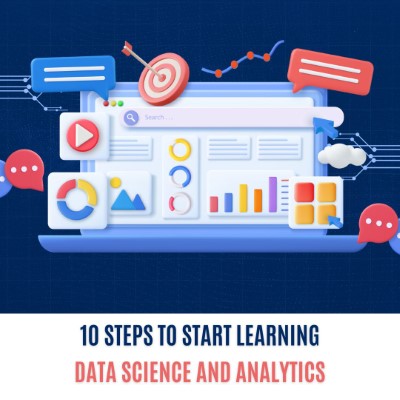An engineer looking to start learning data science and analytics can follow a structured approach to build the necessary skills and knowledge. Here’s a step-by-step guide to help get started:
1. Understand the Basics
- Statistics and Probability: Familiarize yourself with basic statistical concepts such as mean, median, variance, standard deviation, probability distributions, hypothesis testing, and regression analysis.
- Mathematics: Strengthen your understanding of linear algebra, calculus, and differential equations, which are essential for machine learning algorithms.
2. Learn Programming
- Python: Start with Python, which is widely used in data science. Learn the basics of programming, data structures, and libraries like NumPy, Pandas, Matplotlib, and Seaborn for data manipulation and visualization.
- R: Although Python is more popular, R is also a powerful language for statistical analysis and visualization.
3. Data Handling and Processing
- Data Wrangling: Learn techniques for cleaning and preprocessing data using libraries like Pandas in Python.
- Databases: Understand how to use SQL for querying databases and handling large datasets.
4. Learn Data Visualization
- Matplotlib and Seaborn: Learn how to create plots and visualizations in Python to understand data patterns and trends.
- Tableau/Power BI: Familiarize yourself with these tools for creating interactive visualizations and dashboards.
5. Introduction to Machine Learning
- Supervised Learning: Learn about linear regression, logistic regression, decision trees, random forests, and support vector machines.
- Unsupervised Learning: Understand clustering techniques like k-means, hierarchical clustering, and dimensionality reduction techniques like PCA.
- Deep Learning: Get an introduction to neural networks and frameworks like TensorFlow and PyTorch.
6. Online Courses and Certifications
- MOOCs: Enroll in online courses on platforms like Coursera, edX, Udacity, and DataCamp. Recommended courses include:
- “Data Science Specialization” by Johns Hopkins University on Coursera.
- “Machine Learning” by Andrew Ng on Coursera.
- “Deep Learning Specialization” by Andrew Ng on Coursera.
- “Python for Data Science and Machine Learning Bootcamp” on Udemy.
- Certifications: Consider obtaining certifications like IBM Data Science Professional Certificate, Google Data Analytics Professional Certificate, or Microsoft Certified: Azure Data Scientist Associate.
7. Practical Application
- Projects: Start working on small projects to apply what you’ve learned. Analyze datasets from sources like Kaggle, UCI Machine Learning Repository, or public datasets from government websites.
- Competitions: Participate in data science competitions on platforms like Kaggle to gain hands-on experience and improve your skills.
8. Domain-Specific Applications
- Electrical Engineering Projects: Integrate data science into your existing electrical engineering projects. For example, apply machine learning to predict equipment failures, optimize energy consumption, or analyze sensor data.
- Case Studies: Study case studies where data science has been applied to electrical engineering problems to understand real-world applications.
9. Networking and Community
- Join Communities: Engage with data science communities on forums like Reddit, Stack Overflow, and specialized LinkedIn groups.
- Meetups and Conferences: Attend meetups, webinars, and conferences related to data science and electrical engineering to network with professionals and stay updated on the latest trends.
10. Continual Learning
- Stay Updated: Follow blogs, podcasts, and YouTube channels focused on data science and analytics.
- Advanced Topics: Once you’re comfortable with the basics, delve into advanced topics such as reinforcement learning, natural language processing, and big data technologies.
By following this structured approach, an electrical engineer can systematically build the skills necessary to excel in data science and analytics, enhancing their ability to solve complex problems and drive innovation in their field.
